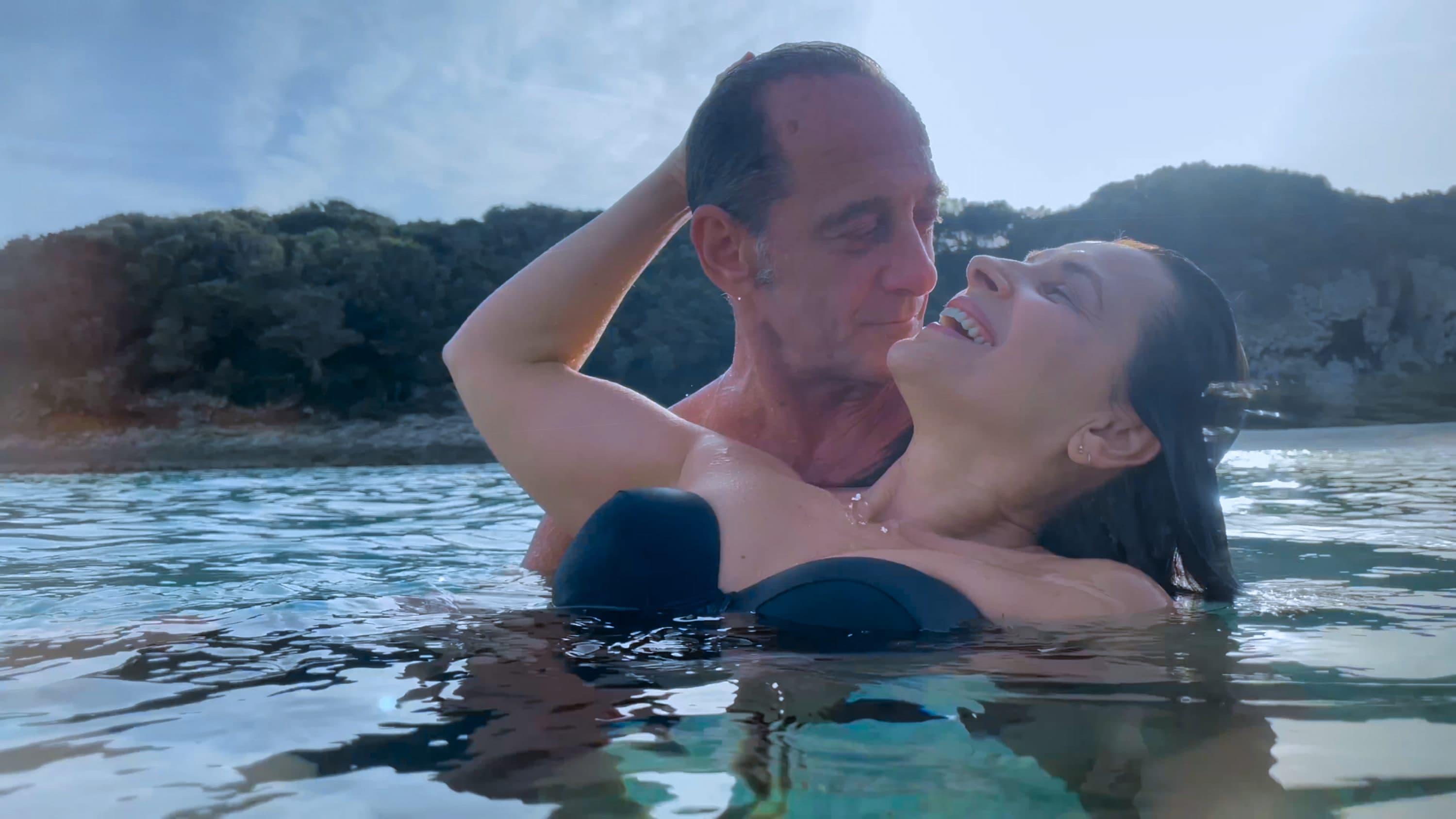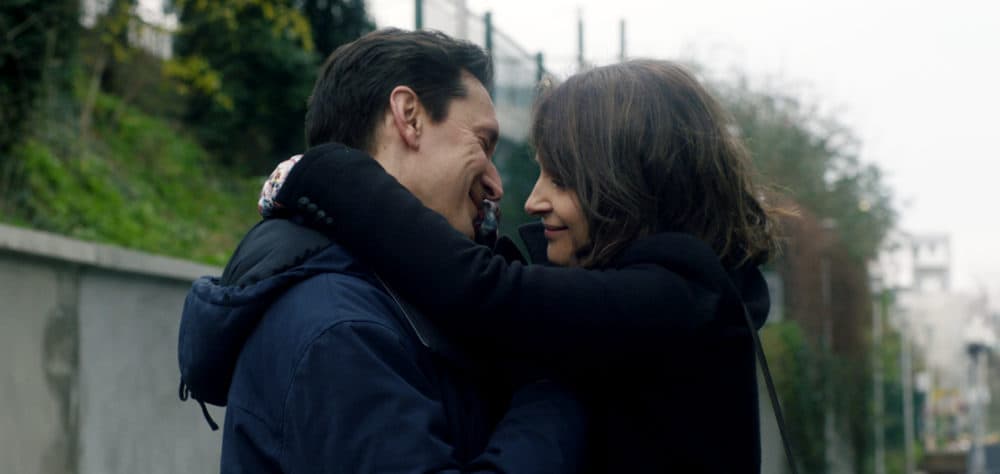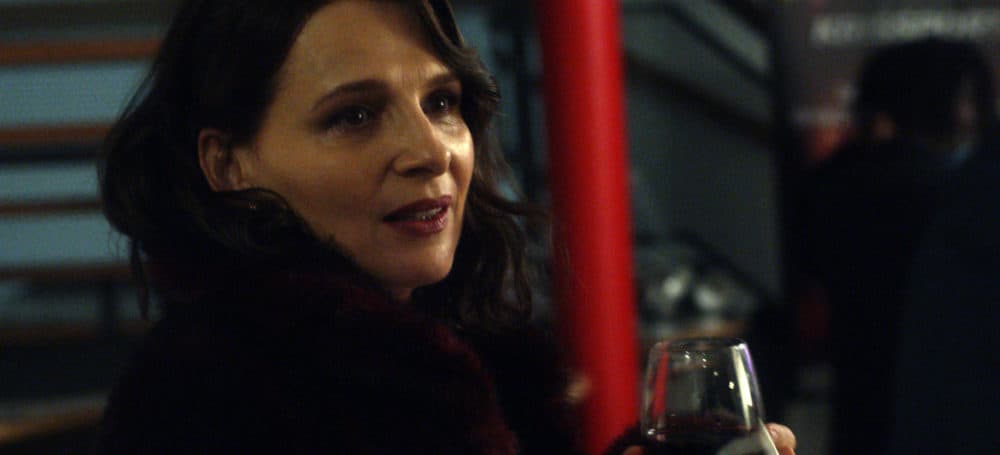Advertisement
Review
Melodrama 'Both Sides of the Blade' is about the battles between our bodies and our minds

The opening idyll is too good to be true. Claire Denis’ doomy romantic melodrama “Both Sides of the Blade” begins with Juliette Binoche’s Sara and her husband Jean (Vincent Lindon) splashing around the surf in an island paradise, making out like high schoolers who can’t keep their hands off each other. I’ve always found it one of the more aspirational aspects of this filmmaker’s work that characters in their late 50s and early 60s are still getting it on all the time like horny teenagers — Vive la France! — but alas, their tropical reverie is short-lived. A hard cut to a train entering a tunnel could be taken as a sight gag a la Hitchcock’s infamous insinuation of intercourse that ended “North by Northwest,” except this one quickly grinds to a halt back in Paris. We’re home again, with all its discontents.
On the surface, it seems like a pretty swank life. Sara’s the host of a popular national affairs show on public radio, while Jean is an ex-rugby player and doting house-husband who does all the shopping and chores. But cracks and fissures appear almost immediately. We soon learn he’s got a son stashed out in the suburbs — a troubled teenager (Issa Perica) living with his grandmother (French cinema legend Bulle Ogier) who at her age isn’t up to handling him. Jean left the kid with his mom years ago when he went to prison — we’re never told his crime — and some days he drives all the way out to their neighborhood to go grocery shopping but doesn’t bother to stop in and say hello. Some days he just drives.
Lindon is one of the movie’s great hunky hangdogs, and we can see how diminished Jean feels whenever he has to ask Sara for the credit card. But there’s a new business opportunity on the horizon, a sports management firm run by his old friend François (Grégoire Colin). The only catch is that François is Sara’s ex, from an affair that ended a decade prior under mysterious circumstances. She says she got over it ages ago, yet when Sara gets a glimpse of François from across the street she goes all weak in the knees. Binoche begins hyperventilating like a 19th-century handmaiden and Denis pulls out all the stops with a wobbly, subjective camera to the strains of a bottom-heavy, cello-scraping score from her usual house band Tindersticks. The filmmaking becomes completely unhinged whenever Sara sees François, our poised public radio host reduced to a breathy bundle of nerves.

Most of us have got that one ex that can still make us crazy, the kind with whom a chance encounter can throw off your entire day. But Sara’s over-the-top reaction to seeing François again borders on the demented, and Denis deliberately keeps him as far away from us as possible. Whatever happened with François was so long ago he exists as more of an idea to her than an actual person — a notion via which our restless heroine can tear apart her comfortably staid, settled life with Jean. He’s an inscrutable phantom of a former love and a convenient escape route. (Colin is no stranger to playing abstract objects of desire for Denis, having starred as the young soldier secretly lusted after by Denis Lavant in her 2000 masterpiece “Beau Travail.”) François is the excuse she needs to blow it all up, but she’ll never admit as much. Sara talks about tough subjects for a living and can articulate everything except for what she’s feeling.
Binoche has quietly and radiantly become one of the gutsiest performers of her generation, but not by gimmicks like gaining weight or ugly-ing herself up with prosthetics the way other actors do when they want to win awards. Instead, she appears blissfully unconcerned with endearing herself to an audience, playing interestingly imperfect characters who make poor decisions and sometimes selfishly follow their own desires wherever they may lead. This is her third straight film with Denis and the two share a simpatico, unapologetic approach to exploring complicated women. (Perhaps the quintessential Claire Denis moment came after an IFFBoston screening of “High Life” at the Brattle, when the director addressed the frequent criticism that her films lack positive female role models by saying, “What the f---? I’m not a social worker.”)

“Both Sides of the Blade” is based on a novel by Christine Angot, who co-wrote the screenplay with Denis. The author and filmmaker previously worked together on 2017’s abysmally titled “Let the Sunshine In,” Denis’ first collaboration with Binoche and a bitterly funny, semi-autobiographical comedy about bad sex, unsuitable suitors and other assorted hazards of being single and middle-aged. This is a darker, much moodier piece but no less attuned to the little lies we tell ourselves that help us make it through the night. It’s a pandemic movie in which COVID-19 is never mentioned, the masks and plexiglass screens all over Paris unremarked upon facts of everyday life doubling as convenient, marginal metaphors for the psychological barriers these characters have put up around themselves.
As a filmmaker, Denis is allergic to exposition and has often copped to cutting out any scenes from her scripts in which characters explain things to each other. In her best movies, this can be bracing for the viewer — keeping us alert enough to assemble the story on our own. Other times, it’s infuriatingly vague, like trying to put together a jigsaw puzzle with half the pieces missing. “Both Sides of the Blade” can be annoyingly ambiguous at times — why did Jean go to prison? — and the subplot with the teenage son doesn’t work at all, seemingly shoehorned in so the filmmaker can inelegantly work in one of her rants about identity politics. (It is, however, nice to see Mati Diop, co-star of Denis’ great “35 Shots of Rum” and a wonderful director in her own right.)
Advertisement
Yet this messiness feels of a piece in a movie about such messy lives. No living director so evocatively photographs a tangle of limbs, or captures the electric charge of two people sharing a small physical space. Like so many Claire Denis films, “Both Sides of the Blade” is about the battles between our bodies and our minds, wherein our unexplainable longings beat out logic and what’s good for us every time.
"Both Sides of the Blade" opens Friday, July 15 at the Coolidge Corner Theatre.
